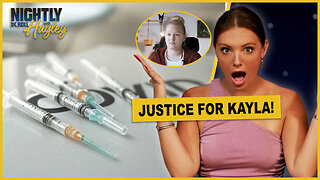Premium Only Content

Canadian euthanasia doctor gushes about how much she enjoys killing people
In the recently released BBC documentary Better Off Dead?, disability rights activist Liz Carr interviewed Dr. Ellen Wiebe, Canada’s most notorious euthanasia doctor. Wiebe is also an abortionist and an activist with Dying With Dignity, the euthanasia lobby group seeking to expand eligibility for assisted suicide in Canada even further. Wiebe’s attempted defence of Canada’s euthanasia regime backfired when throughout her interview, she laughed and smiled as she discussed ending the lives of patients.
“I love my job,” she told Carr. “I’ve always loved being a doctor and I delivered over 1,000 babies and I took care of families, but this is the very best work I’ve ever done in the last seven years. And people ask me why, and I think well, doctors like grateful patients, and nobody is more grateful than my patients now and their families.” Her euthanasia patients, it must be noted, are dead. As one disturbed watcher noted on social media: “Enjoying her job a little too much, I felt.” Many others concurred.
Carr pushed Wiebe several times on the threat euthanasia poses to vulnerable populations, but Wiebe was having none of it. “I’ve certainly met people who are no more disabled than I am saying that life is not acceptable in this state,” she said. “And I would say, ‘Hm, you and I are different.’ But not different in the sense of wanting to have some control.” Carr responded: “For me, I’m concerned that giving the option and the right to a group of people puts another group of people at risk. But I don’t feel you see that as a worry.”
Carr is right. “What you’re saying is to protect what you consider vulnerable people you are condemning others to unbearable suffering,” Wiebe said. “But I am so glad, so glad that I’m a Canadian and that we have this law so that people can choose that or not choose that. But to say that somebody has to suffer like that is simply cruel.” In short, Wiebe rejects the case made by disability rights groups that they are vulnerable, and that social pressure and even coercion often accompanies euthanasia.
-
 51:41
51:41
BonginoReport
9 hours agoParalyzed Woman Blames COVID-19 Jab, Sues Moderna! - Nightly Scroll w/ Hayley Caronia (Ep.103)
96.1K56 -
 LIVE
LIVE
Midnight In The Mountains
3 hours agoGaming w/ PER·SE·VER·ANCE | Friday Night Fortnite | Rumbles Power Couple the Midnights!
46 watching -
 LIVE
LIVE
Illyes Jr Gaming
1 hour ago8/1/25 LFG No Stopping Now!
49 watching -
 LIVE
LIVE
BSparksGaming
2 hours agoN64 Games on Switch 2! Let's Play Some Classics!
45 watching -
 7:45:32
7:45:32
Dr Disrespect
9 hours ago🔴LIVE - DR DISRESPECT - STREAMING UNTIL I GET A 25 KILL GAME
212K9 -
 1:45:36
1:45:36
Robert Gouveia
3 hours agoNew Jail Video 'Discrepancies' DISCOVERED! FBI Burn Bag! Biden Appointee FIRED!
27.6K4 -
 15:18
15:18
T-SPLY
5 hours agoCNN DROPPED a NUKE On Democrats - Worst Polls Ever!
10.2K13 -
 7:21
7:21
SKAP ATTACK
7 hours agoNBA Execs Think the Bubble Championship is a Joke
10.2K2 -
 8:29
8:29
ARFCOM News
6 hours ago $0.51 earnedAG ~~REFUSES~~ To Stop Enforcing Unconstitutional Law | How Trump Plans To Give Guns Back To Felons
10.8K4 -
 12:23:50
12:23:50
LFA TV
1 day agoLFA TV ALL DAY STREAM - FRIDAY 8/1/25
185K32